The Silver Casket (4 page)
Authors: Chris Mould

The Legend of Angel Cuzco
Much later, Stanley was in his favorite room, which was full of drawers that held interesting contents. He searched through the piles of books and papers, trying to find something to stop the coming of the ghostly villains who were headed their way. Was there anything he and Daisy could say or do that would be of assistance?
He had searched all afternoon and not found much, but one scrappy piece of old parchment caught his attention. It was a letter. The top part was missing, but beneath it was clear.
An icy chill took hold of Stanley as he read it, and he decided he needed to find Daisy. The letter was something to be shared.
Stanley ran down the stairs shouting Daisy's name. She was in the scullery, leafing through a book.
Stanley sat down at Daisy's side, placing himself in a tall wing-backed chair near the fireplace.
“The first part is missing, Daisy, but listen to this.”
Do you know who comes to find you? Have you seen their deadly figures, their
ragged bones, and stinking foul faces? They belong to nightmares. To tales of woe and terror.
ragged bones, and stinking foul faces? They belong to nightmares. To tales of woe and terror.
Do you know of the legend of Angel Cuzco?
Stanley stopped, and he and Daisy looked at each other. The two of them huddled together around the fire and Stanley continued.
Angel was the scourge of the South American coast. Often he joined forces with others, but he was known to like his own company and he feared no one. Dressed in scarlet, with plaited golden-white hair and nut-brown skin, he was a sight, to be sure.
It was maybe two hundred years ago that the Ibis sat buried in a church in Cuzco. It
rested under a stone slab of a tomb adorned with the statue of an angel.
rested under a stone slab of a tomb adorned with the statue of an angel.
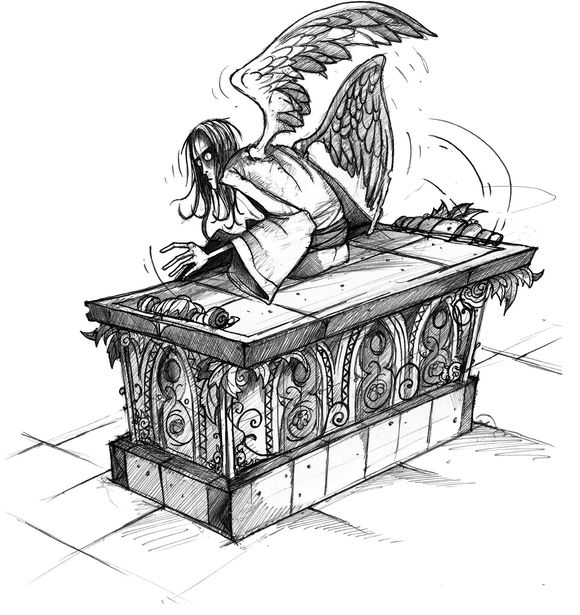
They say the power of the Ibis was so strong that the body returned to life in the form of the angel and stole away with the sacred bird. In a bid to keep it, the angel donned the robes of the pirate trade and fled to the east. He fought so hard to keep it that he became the most feared buccaneer of the seven seas.
He lost the Ibis when he was overcome by a ship carrying monstrous buccaneers.
It is said that his evil ways reduced his wings to stumps upon his back, and that in the end he died defending a gang of Peruvian brothers that he had befriended.
If I were you, I would gather my belongings and escape while there is still a chance that I shall see you again.
Make haste.
Your affectionate brother,
And the rest was torn away.
“Is that a true story, Stanley?” asked Daisy, who, even though sitting by the roaring fire, was shaking like a leaf.
“Well, maybe it is and maybe it isn't. But I'm sure that sooner or later, we will find out.” With nervous hands Stanley folded it back into its age-old creases and returned it to the drawer.
The Timber Trail
That night, Stanley and Daisy looked out at the darkness of the ocean from the staircase window. A huge boat had arrived in the harbor.
“They're here,” panicked Stanley. The pair of them peered more intently through the glass, squinting their eyes.
“That's no pirate ship, Stanley. It's a ferry!” claimed Daisy.
The two of them stood watching.
Then there was movement. Something began to move down the gangplanks at one end of the boat. The fire baskets were burning, and they illuminated a long winding shape that snaked upward into the harbor, moving toward the moor. It was creaking and grinding like the train that had brought Stanley to the island. What was it?
Stanley and Daisy looked more closely still, and soon they realized that a trail of wooden wagons, one behind another, was approaching them. Flickering lamps hung from them, dancing in the dark.
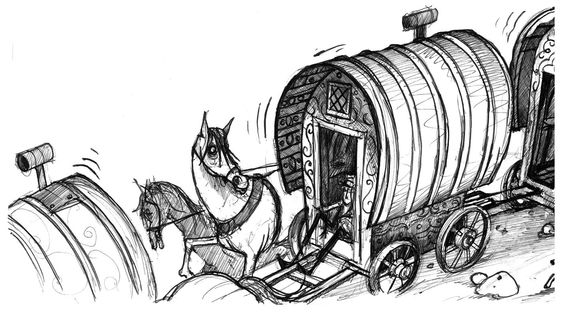
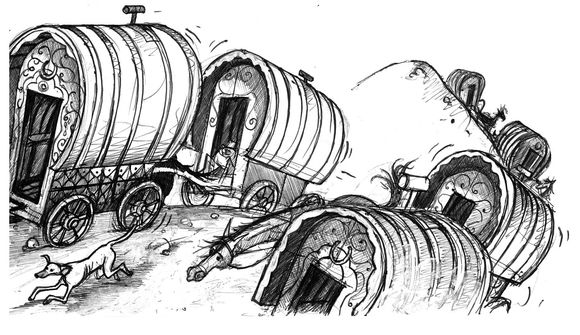
They ran from room to room, chasing the trail from window to window.
“Wait, I know these people! Don't worry, Stanley,” said Daisy. They are travelers, and they have been here before. They are good people, with many friends on Crampton Rock. They will be welcomed. They stay up on the moor when they are here, but recently the curse of the werewolf had driven them away, because many were lost in its grip. They must know the beast is goneâthey say that word spreads fast in the world of the traveling man.”
On they went to the moor, and when the travelers were far enough out, they rested in a large circle. The light from a campfire laid an orange cast across the hill, and the howl of dogs sailed eerily through the night air. A tent was pitched and sat comfortably protected by the wagons. Silhouettes of people moved around in the warm glow.
The fire danced all night, and Stanley fell asleep to the distant sounds of laughing and singing.
In the morning Stanley was sitting by the fire with a warm drink when a knock at the door
disturbed the moment. A tall gypsy man stood in the early light. He had long hair and wore clogs. A heavy coat hung from his shoulders, tied around the waist with rope.
disturbed the moment. A tall gypsy man stood in the early light. He had long hair and wore clogs. A heavy coat hung from his shoulders, tied around the waist with rope.
“I come to thank the good lady for the fresh water when we arrived,” he chirped. He had an accent that was strange to Stanley, and his manner was pleasant. He pulled his coat open to show a brace of rabbits, and handed them to Stanley.
“Oh ⦠er, thank you!” said Stanley.

“You must be the lad,” the man added. “I wanted to see you.”
“Oh! About what?” Stanley quizzed.
“You misunderstand me, son,” he said. “I mean, I wanted to see what you look like.”
Stanley looked confused. Daisy joined him at the door and they glanced at each other with raised eyebrows.
“The name's Phinn. The folks would like to see you,” the man said, confusing Stanley further. “So when you're ready, come along.”
And he clomped down the path in his clogged feet and walked back across the moor.
Mrs. Carelli was behind Stanley now. She placed warm hands across his shoulders.
“Don't worry, Stanley. They are good people. They were the first ones on the
island, and they gave this place to us. Sometimes they are here for months, and sometimes only days. But this time they come for you. Among other things they bring help and they bring hope. We may have a fight on our hands, but all is not lost. Not yet.”
island, and they gave this place to us. Sometimes they are here for months, and sometimes only days. But this time they come for you. Among other things they bring help and they bring hope. We may have a fight on our hands, but all is not lost. Not yet.”
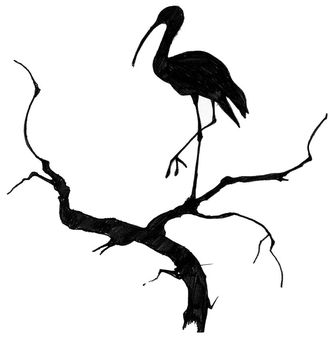
They looked out to sea and wondered what would next appear over the horizon.
“The pirates are coming,” said Stanley. “And we cannot keep them at bay forever.”
“Go and see the travelers, Stanley. They may hold the answer to our problems,”
suggested Mrs. Carelli.
suggested Mrs. Carelli.
Stanley went to get himself ready. In half an hour he would be climbing up to the moor.
The Glass Ball
“Will you come with me, Daisy?” asked Stanley, wrapping his coat around him.
“Of course,” she replied, and they made their way out of the kitchen door and across the back lawn to the rusted gate. They trod the beaten track on to the moor, where the home of the travelers spread out before them.
As they drew near they could see that there were more tents pitched around the central one and that the fire was still burning. Small children ran in and out of the wagons, and lank dogs with missing legs meandered aimlessly around the camp.
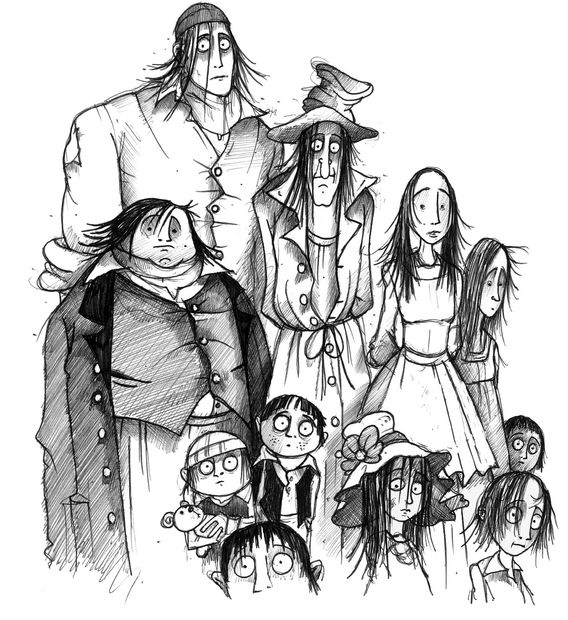
Stanley remembered his first encounters with the dogs of Crampton Rock: all of them with lost limbs, and all of them escaped victims of the werewolf. Here was a sure sign that the travelers were no strangers to this peculiar island.
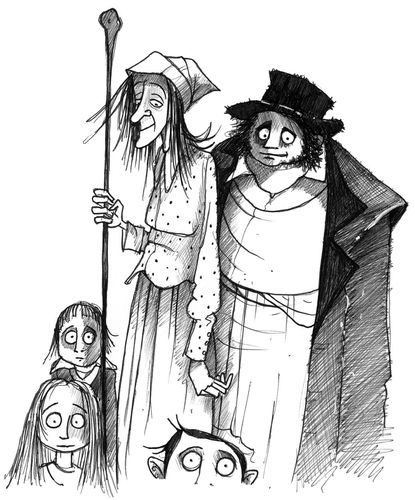
A group of people were standing around in a ring, and in the middle two giant men were boxing each other bravely with bare hands.
It was strange to see so much activity out on the moor.
But when Stanley and Daisy came close, everything stopped. People turned and looked, putting down their tools or whatever they were holding. The children stopped playing and the boxers lowered their fists.
They all came forward and held out their hands to Stanley. Phinn appeared again. He stood on a wheel of one of the wagons and addressed everyone.
“This young man is Stanley Buggles. He banished the curse of the wolf from these lands, killing the beast that took our brothers and leaving us free to settle here whenever we please.”
The crowd cheered and the people shook Stanley's hand and ruffled his hair. One of the boxers picked him up and carried him above his head. They arrived at one of the tents and Phinn followed, bringing Daisy with him.
The boxer placed Stanley back on his feet and held out a giant hand. “My name is Bartley. My brother was taken from me by the wolf, and I wear his memory on my heart. Thank you, boy,” he said. “I will be forever grateful to you.”
He had the biggest, strongest hands that Stanley had ever seen, yet he seemed as gentle as it was possible to imagine.
Inside the tent, an old woman sat at a small table. A length of fabric was thrown over it, concealing its legs and lower section. On top there was an object covered in a velvet cloth.
Two halves of a barrel were placed at her side to form a pair of seats.
Two halves of a barrel were placed at her side to form a pair of seats.
She invited the guests to sit down and be comfortable, and someone brought a strange drink that boiled with smoke. They didn't dare ask what was in it, but they drank it and licked their lips and asked for more.
“My name is Greta,” said the old woman. She had a soft, gentle voice and she was old and craggy. “We want to help you, Stanley. You are a friend of the gypsies now, and your enemies are ours also. Give me your hands.”
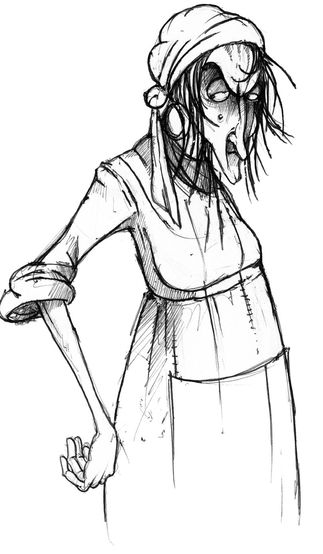
Stanley held them out to her and she clutched them in her own. They were dry and creased, but smooth to touch and much warmer than his. Then she took the velvet cloth away and revealed a glass ball in the middle of the table.
“Lay them on the crystal. It will help,” she said, staring hard into the sphere. “Do you see them, Stanley? Do you see what awaits you?”
It meant nothing to Stanley. He could not see anything except for the glass ball with his hands on the top and the old woman gazing into it with her face lighting up in surprise.
“What ⦠what is it?” asked Stanley.
“They come from all corners of the earth. And they come in their thousands. From the depths of the ground they stir, like swarms of poisonous insects. Of all the enemies that
come, one ship sails alone. When she arrives she will settle in the north bay. She wears the Yellow Jack and none will come near her.”
come, one ship sails alone. When she arrives she will settle in the north bay. She wears the Yellow Jack and none will come near her.”
“What does that mean?” Daisy piped up.
“The Yellow Jack is the flag flown in warning of the fever,” Greta explained.
“You mean that one of the ships is filled with pirates who are ill?”
“Yes, dreadfully ill. They have the buccaneer's bones, a disease to punish the worst of any pirate spirits. But they will try and get here all the same. The Ibis draws them near.”
“We must be extra careful to avoid the sickness then,” said Stanley.
“It cannot harm you, Stanley. It is an illness of those who wander the earth in their skeletal form. The spirit is willing, but the body turns putrid and poisonous and burns itself out through a ghastly fever. Foul and stinking
is the stench of buccaneer's bones. You will surely know it if you come across it.”
is the stench of buccaneer's bones. You will surely know it if you come across it.”
“And what about the Ibis? How did you know of it, and that it's here?” asked Stanley.
“The legend is older than all of us. The sacred bird has been to more places than all the travelers here put together, and lived a million lifetimes. Most people know nothing of it and of the ones that do, some are good, some bad. Many think they own it, but very few deserve it.
“Your image came to me in my crystal ball when you defeated the wolf. I watched you out there on the moor, brave and alone. From then on your shape showed itself many times in the crystal and I saw you through the spiraling fog of the glass when you discovered the Ibis.
“Right now what matters is that those villains
know the Ibis is here, and they want it. There are many traveling men here, Stanley, tough, hard men who will fight to protect you. But they are up against a tough enemy. Strong is he who fights by the side of his own brother. But unbeatable is the man who walks in the shadow of his own death.”
know the Ibis is here, and they want it. There are many traveling men here, Stanley, tough, hard men who will fight to protect you. But they are up against a tough enemy. Strong is he who fights by the side of his own brother. But unbeatable is the man who walks in the shadow of his own death.”
Greta looked into the ball again, her face near the glass.
“Who is this who walks along the ocean floor, dressed in red with a shock of white hair and a cutting blade held at his side? With eyes of green, and stumps upon his back?”
Stanley and Daisy froze. So, Angel Cuzco was more than just a legend.
Greta watched carefully. She described murky, darkened depths where weary pirate bones were reassembling themselves out of their old sea chest. A pair of skeletal companions
were dressing their ragged selves, and rusted weapons hung from their hands. A broken padlock lay at their feet and the chest was scattered in splinters upon the murky sand.
were dressing their ragged selves, and rusted weapons hung from their hands. A broken padlock lay at their feet and the chest was scattered in splinters upon the murky sand.
But two green eyes shone in the bubbling blue of her ball, and with blinding speed the Angel appeared to be marching toward them. He cut through the pirates without pausing and sent their limbs floating like dead fish until they settled in the sand.
Stanley and Daisy sat silently, their faces pale.
“Enough,” Greta said. She knew that what she had seen disturbed Stanley and Daisy, and that if she told them any more she would only frighten them further.
Other books
The Birds and the Bees by Milly Johnson
The Third Day, The Frost by John Marsden
Closed for Winter by Jorn Lier Horst
Here I Am by Rochelle Alers
His Christmas Wish by Marquita Valentine
Ship Breaker by Bacigalupi, Paolo
My Fair Princess by Vanessa Kelly
A Stranger’s Touch by Lacey Savage
By Royal Command by Charlie Higson
